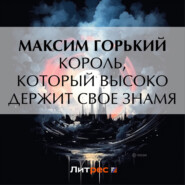По всем вопросам обращайтесь на: info@litportal.ru
(©) 2003-2024.
✖
The Man Who Was Afraid
Настройки чтения
Размер шрифта
Высота строк
Поля
“I know; they’re very rich. Three brothers. I know them all. One is a cripple, the other a fool, and the third a miser. Go on!”
“I served under him for two years. And then I married his daughter,” narrated Mayakin in a hoarse voice.
“The superintendent’s? That wasn’t foolish at all.” Taras became thoughtful and was silent awhile. The old man looked at his sad face and understood his son.
“And so you lived with your wife happily,” he said. “Well, what can you do? To the dead belongs paradise, and the living must live on. You are not so very old as yet. Have you been a widower long?”
“This is the third year.”
“So? And how did you chance upon the soda factory?”
“That belongs to my father-in-law.”
“Aha! What is your salary?”
“About five thousand.”
“Mm. That’s not a stale crust. Yes, that’s a galley slave for you!”
Taras glanced at his father with a firm look and asked him drily:
“By the way, what makes you think that I was a convict?”
The old man glanced at his son with astonishment, which was quickly changed into joy:
“Ah! What then? You were not? The devil take them! Then – how was it? Don’t take offence! How could I know? They said you were in Siberia! Well, and there are the galleys!”
“To make an end of this once for all,” said Taras, seriously and impressively, clapping his hand on his knee, “I’ll tell you right now how it all happened. I was banished to Siberia to settle there for six years, and, during all the time of my exile, I lived in the mining region of the Lena. In Moscow I was imprisoned for about nine months. That’s all!”
“So-o! But what does it mean?” muttered Yakov Tarasovich, with confusion and joy.
“And here they circulated that absurd rumour.”
“That’s right – it is absurd indeed!” said the old man, distressed.
“And it did a pretty great deal of harm on a certain occasion.”
“Really? Is that possible?”
“Yes. I was about to go into business for myself, and my credit was ruined on account of – ”
“Pshaw!” said Yakov Tarasovich, as he spat angrily. “Oh, devil! Come, come, is that possible?”
Foma sat all this time in his corner, listening to the conversation between the Mayakins, and, blinking perplexedly, he fixedly examined the newcomer. Recalling Lubov’s bearing toward her brother, and influenced, to a certain degree, by her stories about Taras, he expected to see in him something unusual, something unlike the ordinary people. He had thought that Taras would speak in some peculiar way, would dress in a manner peculiar to himself; and in general he would be unlike other people. While before him sat a sedate, stout man, faultlessly dressed, with stern eyes, very much like his father in face, and the only difference between them was that the son had a cigar in his mouth and a black beard. He spoke briefly in a business-like way of everyday things – where was, then, that peculiar something about him? Now he began to tell his father of the profits in the manufacture of soda. He had not been a galley slave – Lubov had lied! And Foma was very much pleased when he pictured to himself how he would speak to Lubov about her brother.
Now and then she appeared in the doorway during the conversation between her father and her brother. Her face was radiant with happiness, and her eyes beamed with joy as she looked at the black figure of Taras, clad in such a peculiarly thick frock coat, with pockets on the sides and with big buttons. She walked on tiptoe, and somehow always stretched her neck toward her brother. Foma looked at her questioningly, but she did not notice him, constantly running back and forth past the door, with plates and bottles in her hands.
It so happened that she glanced into the room just when her brother was telling her father about the galleys. She stopped as though petrified, holding a tray in her outstretched hands and listened to everything her brother said about the punishment inflicted upon him. She listened, and slowly walked away, without catching Foma’s astonished and sarcastic glance. Absorbed in his reflections on Taras, slightly offended by the lack of attention shown him, and by the fact that since the handshake at the introduction Taras had not given him a single glance, Foma ceased for awhile to follow the conversation of the Mayakins, and suddenly he felt that someone seized him by the shoulder. He trembled and sprang to his feet, almost felling his godfather, who stood before him with excited face:
“There – look! That is a man! That’s what a Mayakin is! They have seven times boiled him in lye; they have squeezed oil out of him, and yet he lives! Understand? Without any aid – alone – he made his way and found his place and – he is proud! That means Mayakin! A Mayakin means a man who holds his fate in his own hands. Do you understand? Take a lesson from him! Look at him! You cannot find another like him in a hundred; you’d have to look for one in a thousand. What? Just bear this in mind: You cannot forge a Mayakin from man into either devil or angel.”
Stupefied by this tempestuous shock, Foma became confused and did not know what to say in reply to the old man’s noisy song of praise. He saw that Taras, calmly smoking his cigar, was looking at his father, and that the corners of his lips were quivering with a smile. His face looked condescendingly contented, and all his figure somewhat aristocratic and haughty. He seemed to be amused by the old man’s joy.
And Yakov Tarasovich tapped Foma on the chest with his finger and said:
“I do not know him, my own son. He has not opened his soul to me. It may be that such a difference had grown up between us that not only an eagle, but the devil himself cannot cross it. Perhaps his blood has overboiled; that there is not even the scent of the father’s blood in it. But he is a Mayakin! And I can feel it at once! I feel it and say: ‘Today thou forgivest Thy servant, Oh Lord!’”
The old man was trembling with the fever of his exultation, and fairly hopped as he stood before Foma.
“Calm yourself, father!” said Taras, slowly rising from his chair and walking up to his father. “Why confuse the young man? Come, let us sit down.”
He gave Foma a fleeting smile, and, taking his father by the arm, led him toward the table.
“I believe in blood,” said Yakov Tarasovich; “in hereditary blood. Therein lies all power! My father, I remember, told me: ‘Yashka, you are my genuine blood!’ There. The blood of the Mayakins is thick – it is transferred from father to father and no woman can ever weaken it. Let us drink some champagne! Shall we? Very well, then! Tell me more – tell me about yourself. How is it there in Siberia?”
And again, as though frightened and sobered by some thought, the old man fixed his searching eyes upon the face of his son. And a few minutes later the circumstantial but brief replies of his son again aroused in him a noisy joy. Foma kept on listening and watching, as he sat quietly in his corner.
“Gold mining, of course, is a solid business,” said Taras, calmly, with importance, “but it is a rather risky operation and one requiring a large capital. The earth says not a word about what it contains within it. It is very profitable to deal with foreigners. Dealings with them, under any circumstances, yield an enormous percentage. That is a perfectly infallible enterprise. But a weary one, it must be admitted. It does not require much brains; there is no room in it for an extraordinary man; a man with great enterprising power cannot develop in it.”
Lubov entered and invited them all into the dining-room. When the Mayakins stepped out Foma imperceptibly tugged Lubov by the sleeve, and she remained with him alone, inquiring hastily:
“What is it?”
“Nothing,” said Foma, with a smile. “I want to ask you whether you are glad?”
“Of course I am!” exclaimed Lubov.
“And what about?”
“That is, what do you mean?”
“Just so. What about?”
“You’re queer!” said Lubov, looking at him with astonishment. “Can’t you see?”
“What?” asked Foma, sarcastically.
“What’s the trouble with you?” said Lubov, looking at him uneasily.
“Eh, you!” drawled out Foma, with contemptuous pity. “Can your father, can the merchant class beget anything good? Can you expect a radish to bring forth raspberries? And you lied to me. Taras is this, Taras is that. What is in him? A merchant, like the other merchants, and his paunch is also that of the real merchant. He-he!” He was satisfied, seeing that the girl, confused by his words, was biting her lips, now flushing, now turning pale.
“You – you, Foma,” she began, in a choking voice, and suddenly stamping her foot, she cried:
“Don’t you dare to speak to me!”
On reaching the threshold of the room, she turned her angry face to him, and ejaculated in a low voice, emphatically:
“Oh, you malicious man!”
“I served under him for two years. And then I married his daughter,” narrated Mayakin in a hoarse voice.
“The superintendent’s? That wasn’t foolish at all.” Taras became thoughtful and was silent awhile. The old man looked at his sad face and understood his son.
“And so you lived with your wife happily,” he said. “Well, what can you do? To the dead belongs paradise, and the living must live on. You are not so very old as yet. Have you been a widower long?”
“This is the third year.”
“So? And how did you chance upon the soda factory?”
“That belongs to my father-in-law.”
“Aha! What is your salary?”
“About five thousand.”
“Mm. That’s not a stale crust. Yes, that’s a galley slave for you!”
Taras glanced at his father with a firm look and asked him drily:
“By the way, what makes you think that I was a convict?”
The old man glanced at his son with astonishment, which was quickly changed into joy:
“Ah! What then? You were not? The devil take them! Then – how was it? Don’t take offence! How could I know? They said you were in Siberia! Well, and there are the galleys!”
“To make an end of this once for all,” said Taras, seriously and impressively, clapping his hand on his knee, “I’ll tell you right now how it all happened. I was banished to Siberia to settle there for six years, and, during all the time of my exile, I lived in the mining region of the Lena. In Moscow I was imprisoned for about nine months. That’s all!”
“So-o! But what does it mean?” muttered Yakov Tarasovich, with confusion and joy.
“And here they circulated that absurd rumour.”
“That’s right – it is absurd indeed!” said the old man, distressed.
“And it did a pretty great deal of harm on a certain occasion.”
“Really? Is that possible?”
“Yes. I was about to go into business for myself, and my credit was ruined on account of – ”
“Pshaw!” said Yakov Tarasovich, as he spat angrily. “Oh, devil! Come, come, is that possible?”
Foma sat all this time in his corner, listening to the conversation between the Mayakins, and, blinking perplexedly, he fixedly examined the newcomer. Recalling Lubov’s bearing toward her brother, and influenced, to a certain degree, by her stories about Taras, he expected to see in him something unusual, something unlike the ordinary people. He had thought that Taras would speak in some peculiar way, would dress in a manner peculiar to himself; and in general he would be unlike other people. While before him sat a sedate, stout man, faultlessly dressed, with stern eyes, very much like his father in face, and the only difference between them was that the son had a cigar in his mouth and a black beard. He spoke briefly in a business-like way of everyday things – where was, then, that peculiar something about him? Now he began to tell his father of the profits in the manufacture of soda. He had not been a galley slave – Lubov had lied! And Foma was very much pleased when he pictured to himself how he would speak to Lubov about her brother.
Now and then she appeared in the doorway during the conversation between her father and her brother. Her face was radiant with happiness, and her eyes beamed with joy as she looked at the black figure of Taras, clad in such a peculiarly thick frock coat, with pockets on the sides and with big buttons. She walked on tiptoe, and somehow always stretched her neck toward her brother. Foma looked at her questioningly, but she did not notice him, constantly running back and forth past the door, with plates and bottles in her hands.
It so happened that she glanced into the room just when her brother was telling her father about the galleys. She stopped as though petrified, holding a tray in her outstretched hands and listened to everything her brother said about the punishment inflicted upon him. She listened, and slowly walked away, without catching Foma’s astonished and sarcastic glance. Absorbed in his reflections on Taras, slightly offended by the lack of attention shown him, and by the fact that since the handshake at the introduction Taras had not given him a single glance, Foma ceased for awhile to follow the conversation of the Mayakins, and suddenly he felt that someone seized him by the shoulder. He trembled and sprang to his feet, almost felling his godfather, who stood before him with excited face:
“There – look! That is a man! That’s what a Mayakin is! They have seven times boiled him in lye; they have squeezed oil out of him, and yet he lives! Understand? Without any aid – alone – he made his way and found his place and – he is proud! That means Mayakin! A Mayakin means a man who holds his fate in his own hands. Do you understand? Take a lesson from him! Look at him! You cannot find another like him in a hundred; you’d have to look for one in a thousand. What? Just bear this in mind: You cannot forge a Mayakin from man into either devil or angel.”
Stupefied by this tempestuous shock, Foma became confused and did not know what to say in reply to the old man’s noisy song of praise. He saw that Taras, calmly smoking his cigar, was looking at his father, and that the corners of his lips were quivering with a smile. His face looked condescendingly contented, and all his figure somewhat aristocratic and haughty. He seemed to be amused by the old man’s joy.
And Yakov Tarasovich tapped Foma on the chest with his finger and said:
“I do not know him, my own son. He has not opened his soul to me. It may be that such a difference had grown up between us that not only an eagle, but the devil himself cannot cross it. Perhaps his blood has overboiled; that there is not even the scent of the father’s blood in it. But he is a Mayakin! And I can feel it at once! I feel it and say: ‘Today thou forgivest Thy servant, Oh Lord!’”
The old man was trembling with the fever of his exultation, and fairly hopped as he stood before Foma.
“Calm yourself, father!” said Taras, slowly rising from his chair and walking up to his father. “Why confuse the young man? Come, let us sit down.”
He gave Foma a fleeting smile, and, taking his father by the arm, led him toward the table.
“I believe in blood,” said Yakov Tarasovich; “in hereditary blood. Therein lies all power! My father, I remember, told me: ‘Yashka, you are my genuine blood!’ There. The blood of the Mayakins is thick – it is transferred from father to father and no woman can ever weaken it. Let us drink some champagne! Shall we? Very well, then! Tell me more – tell me about yourself. How is it there in Siberia?”
And again, as though frightened and sobered by some thought, the old man fixed his searching eyes upon the face of his son. And a few minutes later the circumstantial but brief replies of his son again aroused in him a noisy joy. Foma kept on listening and watching, as he sat quietly in his corner.
“Gold mining, of course, is a solid business,” said Taras, calmly, with importance, “but it is a rather risky operation and one requiring a large capital. The earth says not a word about what it contains within it. It is very profitable to deal with foreigners. Dealings with them, under any circumstances, yield an enormous percentage. That is a perfectly infallible enterprise. But a weary one, it must be admitted. It does not require much brains; there is no room in it for an extraordinary man; a man with great enterprising power cannot develop in it.”
Lubov entered and invited them all into the dining-room. When the Mayakins stepped out Foma imperceptibly tugged Lubov by the sleeve, and she remained with him alone, inquiring hastily:
“What is it?”
“Nothing,” said Foma, with a smile. “I want to ask you whether you are glad?”
“Of course I am!” exclaimed Lubov.
“And what about?”
“That is, what do you mean?”
“Just so. What about?”
“You’re queer!” said Lubov, looking at him with astonishment. “Can’t you see?”
“What?” asked Foma, sarcastically.
“What’s the trouble with you?” said Lubov, looking at him uneasily.
“Eh, you!” drawled out Foma, with contemptuous pity. “Can your father, can the merchant class beget anything good? Can you expect a radish to bring forth raspberries? And you lied to me. Taras is this, Taras is that. What is in him? A merchant, like the other merchants, and his paunch is also that of the real merchant. He-he!” He was satisfied, seeing that the girl, confused by his words, was biting her lips, now flushing, now turning pale.
“You – you, Foma,” she began, in a choking voice, and suddenly stamping her foot, she cried:
“Don’t you dare to speak to me!”
On reaching the threshold of the room, she turned her angry face to him, and ejaculated in a low voice, emphatically:
“Oh, you malicious man!”

















